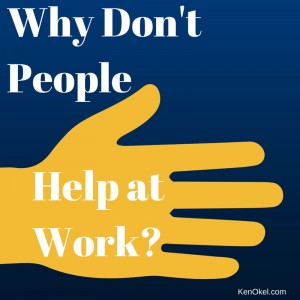On the job, are you in a culture where coworkers help one another? If not, then your organization may be making a critical mistake because people should want to help at work.
During my TV news career, I estimate that I worked with more than 65 different photographers. When paired with someone new to the station, I could quickly figure out his or her experience level when we were on a story. The inexperienced photographers would try to shoot everything.
This may not sound like a bad thing but when you are working against deadline, you don’t have the time to record everything. After all, your story, including soundbites, would be no more than 90 seconds. And while having a variety of shots to choose from was good, it’s a lot easier to select them from less than 10 minutes of raw footage, as opposed to more than 30.
The problem was not one of skill with a camera but being able to transfer that knowledge to the fast paced world of news, where you have to make quick decisions. In order to help the photographer and get the best video for the story, I’d offer pointers, suggestions, and sometimes say, “Hey, you’ve got to get moving.” I don’t know if these were always welcomed but in my mind, it was what needed to be done.
I should mention that in my career, I also worked with some photographers who were much more experienced than me and I benefited greatly from their knowledge. It seemed that to get the best outcome, it’s mutually beneficial to help out the other person, when they lack experience.
I was surprised to learn that this attitude didn’t exist with every news crew. Some reporters and photographers would tell the Assignment Editor, “I don’t want to work with that person,” when there was a significant skill gap. This put the Assignment Editor in a tricky spot and created a weird class system.
What would then happen was that the reporters or photographers who were good at training, tended to get more of the inexperienced people. You would end up with two people who did the same job and earned the same paycheck. Yet one would always have to train the new person.
Over time, this leads to a lack of harmony in a newsroom.
Sound familiar? A lot of businesses hire talented people who need some help in order to maximize their skills. Do they receive it? It depends on whether there’s a culture of helping.
Some will help out of the kindness of their hearts. But over time these people may start to burn out on the extra responsibility that they take on, which may provide no additional compensation or recognition. Before long, helping a coworker becomes optional.
As a leader, are you committed to a culture of helping? Do you want everyone to have the opportunity to maximize their talents with the collective knowledge of your organization? If so, what are you willing to do to facilitate it? It’s easy to say that you want it. It’s much harder to demonstrate that you appreciate it.







